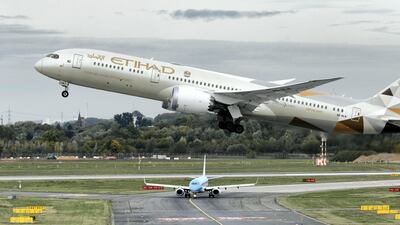Etihad Airways will operate a reduced network of scheduled passenger flights from May 1 to June 30, subject to UAE government travel restrictions being lifted, and the carrier aims to gradually return to full schedule as controls are lifted globally.
“The monumental challenges being faced by all airlines, and our customers, have been beyond measure," Tony Douglas, group chief executive, Etihad Aviation Group, said in a statement on Thursday.
"However, we remain cautiously optimistic and will push ahead with our plans to resume normal flying, while striving to better serve and support our customers and our employees.”
Etihad did not specify the destinations it will resume services to and how many flights it would operate.
The UAE, the region's transit and financial hub, halted all passenger flights starting on March 25 for two weeks due to the coronavirus pandemic. However, the local carriers have been operating a number of special repatriation flights to transport those wanting to exit or enter the country.
“While the intention is to assume a ‘business as usual’ approach to the restart of our operations, the aviation landscape has changed, and how it will look month by month is difficult to predict,” Mr Douglas said.
The Covid-19 pandemic has brought the travel industry worldwide to a halt as countries impose lockdowns and restrictions to contain the outbreak.
The number of planes in storage around the world has reached 8,500 since the beginning of 2020, according to data from aviation research firm Cirium. The International Air Transport Association (Iata) estimates airlines globally will lose $314 billion (Dh115bn) in revenue this year, 55 per cent less than 2019, due to the coronavirus impact and will require $200bn in government aid.
Iata has urged governments to quickly implement pledges of financial support for carriers, warning that 25 million jobs are at risk in a scenario of three months of travel restrictions combined with the plunge in air travel demand.
Etihad said it is currently using 22 Boeing 787 Dreamliners and 777-300ER passenger aircraft, with five more ready for service, to operate its special passenger flights.
___________
Emirates and Etihad in-air distancing tactics: no online check-in or seat selection
___________
Since March 25, Etihad has operated approximately 500 special passenger, freighter and cargo flights. Etihad Cargo is now operating up to 100 turnaround flights per week to 32 destinations on five continents.
In addition to normal scheduled cargo services, special freighter and humanitarian flights have been flown to countries in Africa, Europe and Asia. More special flights will be introduced in the coming weeks, the airline added.
“There have been lessons to be learned. In the early days of this pandemic, the disruption created by border closures and subsequent cancellations meant we were unable to effectively deal with the disruption our customers faced, despite our best efforts," Mr Douglas said.
"We are tremendously pleased that we now have generous and considerate solutions that will undoubtedly deliver tangible benefits to them today, and when the time is right for them to travel again," he added.
“The invaluable loyalty of our customers, our travel trade partners, and a phenomenal workforce which has continued to go above and beyond, despite taking temporary reductions in salary, will guarantee the security and continuity of the UAE’s great national airline.”
With 80 per cent of its passenger fleet on the ground, Etihad also carried out its biggest aircraft maintenance programme.
Etihad Engineering, the group’s Engineering Maintenance Repair and Overhaul division, is performing maintenance work on 96 passenger aircraft.
The programme ranges from minor maintenance tasks, such as seat repairs and updates to Inflight Entertainment Systems, to bringing forward scheduled engine changes and modifications on several aircraft, eliminating the need to withdraw them from service when flights begin operating again.



















